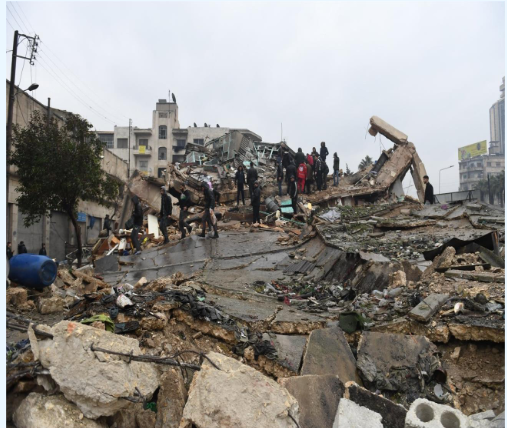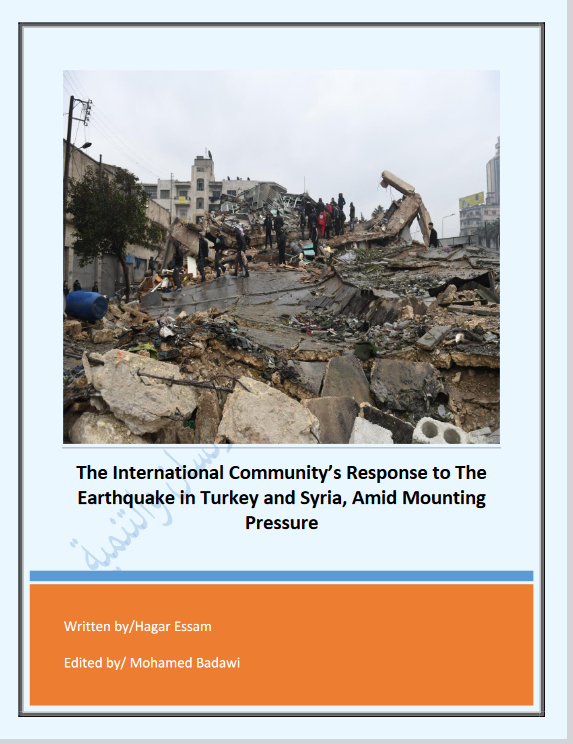Press Release
……………………………………………………..
Today, Thursday, 23/2/2023, the Egyptian Coalition for Human Rights and Development (ECHRD) issues its report on the responses of the international community to the earthquake that affected Turkey and Syria, amid the mounting pressure and the effects of the earthquake that took place at dawn on February 6, 2023. It had a magnitude of 7.8. Its center was Kahramanmaraş in southeastern Turkey. Seven countries, led by Turkey and Syria, were affected by it. The earthquake caused thousands of disasters and many victims, in northern Syria and southern Turkey. The two countries relied on the international community to help families affected by these disasters. So farm on Monday, February 14, more than 35,000 people were reported dead in Turkey and Syria, with thousands of survivors homeless. The number of casualties is expected to increase. However, the international responses have differed in providing aid to both countries.
The report indicated that the unjustified and biased responses of the international community limited the speed of rescuing survivors in Syria, and wasted time. Therefore, local humanitarian organizations located near the earthquake zones had to bear the responsibility of rescuing the victims alongside the families. However, due to the slow international responses and insufficient rescue equipment, a significant number of the individuals who were rescued have lost their lives.
In an effort to mitigate the impact of the devastation in Syria, and the death of nearly 23,000 people, the United States belatedly announced 180-day waiver on sanctions imposed on Syria to allow for humanitarian aid in Syria, after many victims died. Some critics believe that the waiver of sanctions does not mean that there are no other obstacles. It is rather an attempt to reduce the concerns of financial aid providers, and other volunteer agencies, to provide aid to Syria in the face of the disaster.
Given the extent of the damage caused by the disaster in terms of victims and affected people, the collapse of buildings and the destruction of public facilities, the Turkish President Erdogan called for immediate assistance from the international community. Many European countries responded, including the Western countries that still have troubled feelings towards the Turkish president. They have already sent rescue teams in the first hours that followed the devastating earthquake to find the survivors immediately. The EU Emergency Response Coordination Centre deployed rescue teams from to aid Turkey.
In Syria, on the other hand, the situation has worsened, as both government and rebel-controlled areas have been affected since the earthquake occurred, bringing the total death toll to 2,500, according to Syrian media reports on February 8. These negative repercussions come as a result of the international isolation that has been imposed by the international community on the Assad regime since 2011 due to the regime’s brutality at home and the killing of citizens.
The report concludes that there is an absolute necessity to activate the role of the United Nations organs, and for each member state of the Security Council to leave behind their individual interests and take into account the interests of the Syrian people. On one hand, many countries have shown solidarity with Turkey as a result of the devastating earthquakes. On the contrary, Syria cannot rely as much on international aid after 12 years of civil war and international sanctions imposed against its leaders, at a time when Damascus is trying to take advantage of the crisis to legitimize the Syrian regime. Thus, the challenge before the international community is magnified, as it concerns the years of conflict and the humanitarian crisis in Syria, in addition to difficulties in helping the survivors. International aid was slow to arrive after many have already died and many families have been lost. There is also discrimination in the way the afflicted Syrians are treated in Turkey. Moreover, the first United Nations’ humanitarian aid to Syria came late, after many survivors died as a result of the freezing cold and epidemics. To add to that, humanitarian aid convoys face danger due to the destruction of the corridors along borders. Thus, efforts to help citizens in the stricken areas of Syria are still facing a major challenge by the international community.








